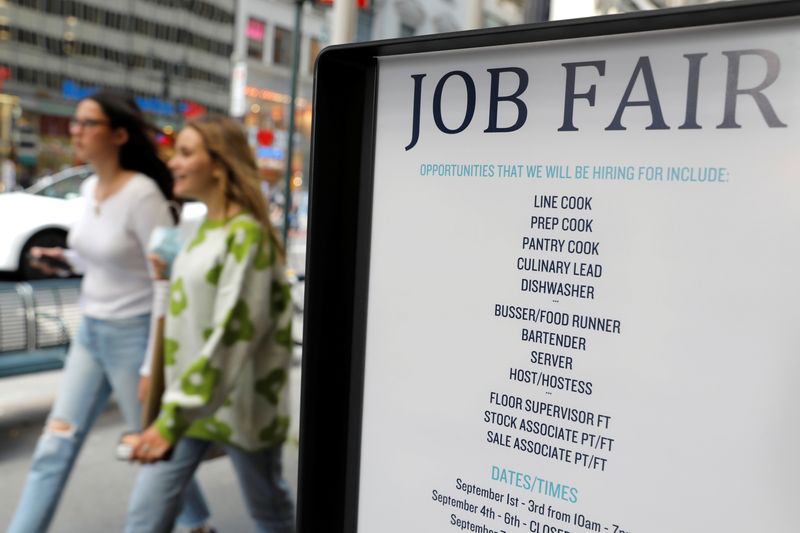By Lucia Mutikani
WASHINGTON (Reuters) - The number of Americans filing new claims for unemployment benefits fell last week, pointing to underlying strength in the labor market that should continue to support the economy.
The second straight weekly decline in claims reported by the Labor Department on Thursday unwound most of the jump at the start of the month, which had lifted applications to a level last seen at the end of last August. Though job growth is slowing as a result of the cumulative impact of hefty Federal Reserve interest rate hikes in 2022 and 2023, layoffs remain very low.
"Claims settled down from the previous week, so the acceleration some had feared hasn't come to pass," said Robert Frick, corporate economist at Navy Federal Credit Union. "The labor market remains robust, and if claims are the canary in the coal mine for jobs, it has yet to develop a mild cough."
Initial claims for state unemployment benefits dropped 8,000 to a seasonally adjusted 215,000 for the week ended May 18. Economists polled by Reuters had forecast 220,000 claims in the latest week. Unadjusted claims decreased 5,663 to 192,017. There were notable declines in filings in California and Indiana.
Companies are generally holding on to their workers after experiencing difficulties finding labor during and after the COVID-19 pandemic.
The U.S. central bank has raised its policy rate by 525 basis points since March 2022 to slow demand in the economy.
Minutes of the Fed's April 30-May 1 policy meeting published on Wednesday showed officials assessed that "demand and supply in the labor market, on net, were continuing to come into better balance, though at a slower rate." But they also noted that conditions had "generally remained tight."
The Fed has kept its benchmark overnight interest rate in the current 5.25%-5.50% range since July. Financial markets expect the first rate cut will come in September. Labor market strength has helped the economy defy predictions of a recession.
The claims data covered the period during which the government surveyed employers for the nonfarm payrolls component of May's employment report. Claims rose slightly between the April and May survey weeks.
Data next week on the number of people receiving benefits after an initial week of aid, a proxy for hiring, could offer more clarity on the state of the labor market. The economy added 175,000 jobs in April.

The so-called continuing claims rose 8,000 to a seasonally adjusted 1.794 million during the week ending May 11, the claims report showed. Continuing claims are at historically low levels.
"There is absolutely no sign that the labor market is unraveling in a major way," said Christopher Rupkey, chief economist at FWDBONDS. "There is no reason for businesses to reduce the headcount at their firms any further because the economy continues to perform relatively well given the degree of monetary restraint the Fed has put in place to fight inflation."